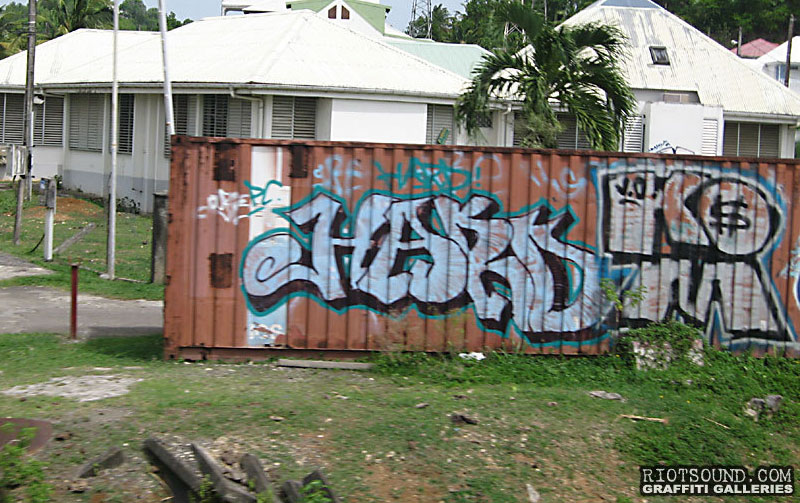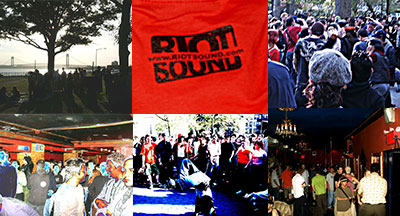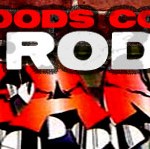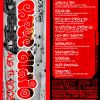by Alex Shtaerman
It’s been seven years since the mainstream first heard Cormega’s raw as fuck, effortless rhyme style on Affirmative Action, a standout track on Nas’ second album It Was Written. Standing his ground in light of contract disputes with Def Jam and pushed back release dates, Cormega is finally shining after releasing two stellar LPs on his own independent label Legal Hustle Records. The Realness, Cormega’s first full length effort released in 2001, sold over 100,000 copies with virtually no marketing budget or advertising. While The Realness was critically acclaimed, Cormega did not rest on his laurels. The following year Legal Hustle Records put out another highly regarded Cormega LP, The True Meaning. At the helm of his own affairs, and persevering through nothing else but his music and lyrics, we find Cormega on the verge of dropping yet another gem. Titled Urban Legend, the new album will be available in the coming months. While featuring the same raw, authentic and introspective style, Urban Legend promises to have a few surprises, as some of the best names in Hip-Hop have progressively gravitated towards this standout Queensbridge lyricist.
Read review for Cormega compilation album Legal Hustle.
Read review for Cormega’s sophomore album The True Meaning.
See pictures from Cormega’s album release party at S.O.B.’s in New York City.
See pictures from Cormega’s show in New York with Immortal Technique.
Read second interview with Cormega.
Read third interview with Cormega.
RIOTSOUND.COM: Looking back on it, are you happy you left Def Jam? Through Legal Hustle Records you have been able to put out music that is true to Hip-Hop and will remain timeless. Although you may not sell as many units this way, do you feel better about the type of music and message you are putting out as opposed to what may have been released if you were still with a major label?
CORMEGA: I don’t think I would have been able to make The Realness if I was on a major label or that particular label that I was on. So I am very happy with the situation right now. I mean the album that I had, which we called The Testament, was pretty similar. It was created in the vein of The Realness. I think I would have still left my mark but they wasn’t ready for that. When I was on Def Jam, I wasn’t getting the respect I deserved as an artist; that I myself felt I deserved. You know, I was on the shelf for four years. That, in effect, can affect anybody’s confidence.
RIOTSOUND.COM: The Realness sold over 100,000 copies. Do you attribute that in any way to your business savvy? They often say that many hustlers would likely be successful businessmen or entrepreneurs had they grown up in the suburbs instead of the ghetto. Having been a hustler, do you now feel some of those skills you’ve picked up translating into powerful real world tools in the music business?
CORMEGA: Uhm. Yea, I think some of what I learned from being a hustler has benefited me as an artist; but I am not saying that I would recommend that everybody do that. I wouldn’t say that everybody should first try to be a hustler in order to be a rapper. Although, I think that is one of the endeavors that made my mind the way it is.
RIOTSOUND.COM: Having established yourself as a great lyricist, who are you still looking forward to working with?
CORMEGA: On record, I want to do a song with Scarface, that’s the artist I want to work with the most. Uhm. who else? Actually, I really don’t listen to Rap right now. I don’t like it. It is what it is, it’s Rap.
RIOTSOUND.COM: Rap Music is more of a commercial vehicle to make money, Hip-Hop is something completely different.
CORMEGA: Exactly. I am not into Rap Music. The last albums I bought was Eric B. & Rakim’s Follow The Leader album, Brand Nubian’s In God We Trust, Main Source. I’m into stuff like that. That’s why I did a record with Large Professor on my last album. I don’t look up to these rappers. I don’t even admire these artists that’s out right now. Even the artists that do songs with these artists don’t admire them. They just do it to benefit their sales. Like, this guy sold four million records so I’ll put him on my record and then I may sell more. But I am not with that. As people already know from my previous two releases, I don’t live off the strength of guest appearances. I only want to work with the great artists that I look up to and I want to do a record with them, because that’s an honor for me.
RIOTSOUND.COM: As a kid growing up in Queensbridge what kind of music did you listen to before you got into Hip-Hop?
CORMEGA: Hip-Hop is all I ever got into, because you figure with R & B, the average kid or teenager is not into R & B, that’s more of an adult music. So when I was growing up all I listened to was Rap. Kool G Rap was one of my favorites; the Juice Crew was everything to us. Everybody loved and wanted to be down with the Juice Crew. I used to like Chubb Rock, Slick Rick was one of my favorites of all time. Public Enemy was very dope and they were a powerful voice. They had a powerful message in their music.
RIOTSOUND.COM: Tell us a bit about this Urban Legend album as far as the making of it? Is this all new material?
CORMEGA: This album is all new material. It’s going to feature my newest artist on the Legal Hustle label. Her name is Dońa. She is Latin. And she is incredible. I can’t even explain how she rhymes. When you hear her rhyme you are not going to believe how she looks. She sounds like she is ugly. She kinda rhymes like me, like real gutter.
RIOTSOUND.COM: Do you sometimes feel that female artists don’t get their due in Rap Music because they are female. Over time, we have had a few female artists but as far as lyricists there has not been as much recognition. So are you happy to be putting out a female artist given the situation?
CORMEGA: Exactly, yes I am. And I think a lot of the female artists may not get the recognition because they bring it upon themselves, because this is the era where sex sells. Women are being looked at as objects as opposed to MC’s. When MC Lyte was out she was cute but nobody was really looking at her like that because we were so focused on what she was saying. With Queen Latifah we were focused on what she was saying, with Shante, we were focused on what she was saying. Nowadays, we are focused on how women look. So I am proud to have an artist who is going to stray away from that.
RIOTSOUND.COM: With all this bootlegging going on, a lot of the major labels are complaining more and more. How do you feel about it? Had The Testament not been bootlegged as much as it was, do you feel people may have forgotten about Cormega?
CORMEGA: Well, actually the whole Testement was never bootlegged. It’s just particular songs off The Testement that were bootlegged; and I think it’s easy to be forgotten in Rap because people have short memories. We have legends and icons of Hip-Hop that are struggling for notoriety. When I was on the shelf, I maneuvered myself. Me and my man did the marketing ourselves. The first Cormega bootleg that ever came out; we did it because Def Jam had me on the shelf. My voice was not being heard and an artist’s longevity depends on people hearing your voice. So we made mixtapes, like The Best Of Cormega, etc, etc. We did it ourselves and then people gravitated towards that. If I didn’t do that I may have been one of those “where is he now?” rappers.
RIOTSOUND.COM: Do you think that putting out mixtapes is going to be the next thing for artists to market themselves? 50 Cent blew up off mixtapes and it seems to be a growing trend.
CORMEGA: A lot of artists are biting that now. I’ve been doing that. But I do think that’s where it’s going. The Rap industry is a piggyback industry. Whatever anyone does with success others emulate it. But I know for a fact that I was the first artist who did not have an album out to do a mixtape. Now they may have all these different tapes like the best of this one or the best of that one. But I know I was the first artist to do that. I know that for a fact. We had our joint out in like 1997. It was called The Montana Way. It featured songs that I did with different artists. We used that as a litmus test for me. I wanted to see if the people were going to gravitate towards that so I could see how many fans I had. I never expected the outcome to be what it was. A lot of people bought The Montana Way and we followed it up with another one. Then people started making more and more Cormega bootlegs. There are so many Cormega bootlegs now that I am not even benefiting from them because I didn’t even do them. We did that in 1997 out of desperation because I wanted my voice to be heard. I did not want to be like one of those rappers like “where is he now?” or like “remember what’s his name, he was nice”.
RIOTSOUND.COM: You said you were surprised by the reaction to the first mixtape that you put out, were you perhaps not as confident in your ability?
CORMEGA: I didn’t have any confidence when I was on Def Jam. It’s like you being on a basketball team and you get no run. It plays with you confidence. I was seeing artists but I didn’t understand the game at the time so it was affecting my confidence. When I was on the Survival Of The Illest Tour back in ’98, by that time we had already put out the first Cormega mixtape and it was circulating. We did cities like Chicago and I thought I was going to get booed because I didn’t think people would be into it. I ended up getting as big an ovation as anybody in both Chicago and Detroit.
RIOTSOUND.COM: What’s next for Legal Hustle? Tell us a bit about some of the artists that will be coming out in the years ahead?
CORMEGA: The biggest thing right now on the table for Legal Hustle is the signing of Dońa. Also, my third album Urban Legend. This is going to be one of my favorite albums because I am getting to do a lot of things I didn’t get to do before. Another thing is the Ayatollah EP, we are working on that together. It’s a collaborative effort. He is doing the production and I am doing the rapping. As far as new artists I am trying to take my time with it because a lot of people get a label and they have to sign a lot of artists because that’s how you get money. Say I just grab any rapper from my projects and then I go to the distributor and say “ok, I have a new artist so now I need a budget for him”. People do that to get money. They treat a person as a product. I don’t really want to do that because every new artist has to be a reflection of you. I don’t want to have a dope album but then when my artist’s album comes out it’s wack. I want every artist to be dope, so I am not rushing it. If I run into the right artist then I will create that; but I do not want to snatch up a bunch of artists and be like “Yo, Legal Hustle, we got this, that one and this one”, I don’t want to do that.
RIOTSOUND.COM: Last thing. When does Urban Legend drop?
CORMEGA: I really wanted to do it in the summer but the way it’s looking it’s not going to come out that soon. It will be out in the fall. Certain songs may take longer because of the availability of the person I want to work with.
CORMEGA: Behold THE TRUE MEANING
Had it not been slept on so hard, Cormega’s first LP, The Realness, would be enjoying classic status right now. Unfortunately things take time for Cory McKay. It’s been seven years since Mega stole the show on Affirmative Action. For the Queensbridge MC who is unashamed to rep his hustling roots, a good portion of that time has been filled with conflict and anticipation. I remember receiving a Violator promo tape some time in 1997 with a couple of tracks from Cormega’s forthcoming Def Jam debut The Testament. I waited and waited but The Testament was never to be released. For five years, one of Hip-Hop’s most anticipated artists sat on the shelf. Contract disputes with Def Jam persisted following a bitter falling out with QB ally and friend Nas. Mega was subsequently cut out of The Firm album featuring Nas, AZ and Foxy Brown and replaced by the enigmatic Nature; and we all know to where that led.
There have been few MCs that have been able to couple meaningful lyrics with a strikingly authentic delivery. Cormega is definitely one of those MCs. Cormega’s style is effortless. When you listen to his words, you get a sense that he is just speaking and not meaning to rhyme or flow on purpose, it just happens to be that way, and that is the beauty of it. Conversely and equally impressive is the complexity entailed therein.
Unlike some of Cory McKay’s previous acquaintances, The True Meaning stays true to the spirit of Hip-Hop. Released on Mega’s own independent label Legal Hustle Records, The True Meaning begins where Legal Hustle’s first release, The Realness, left off. “I killed it with The Realness / Now I’m bringing new life / Prestige is an illusion / People tend to lose sight”. “All I really lack is fame”; points out Cormega on Ain’t Gone Change, an a cappella track equivalent in format to 5 For 40. Flexing a fully loaded lyrical arsenal Mega annihilates the microphone on Verbal Graffiti, a track orchestrated by Hangmen 3 and flavored by Persian jingles.
After spitting venom at Nas for years Cormega breaks down and reconciles the nature of the beef on Love In Love Out. “What’s deep is / I had love for you / But through the situations / I can’t fuck with you / Trust is a luxury I can’t afford / Betrayal’s something that I can’t Ignore”. While many have grown tired of the persistent beef between the two MCs, Love In Love Out is an exceptional track regardless of subject matter. Another quality cut is The Come Up featuring production as well as a rare verse by Large Professor. A Thin Line produced by Buckwild has Mega reprimanding a snitch for breaking the hustler’s code of honor and cooperating with police. “There’s a thin line between love and hate and you crossed it / You had respect around the way and you lost it / If a coward dies a thousand death, how you gonna live?”
In The Legacy, Cormega reminisces of days gone by while eluding to many of QB’s Hip-Hop heroes. In Soul Food he speaks of a love triangle, rhyming over the instantly recognizable beat from 3 Card Molly, a track blessed by The Golden State Warriors in ’98. Not being a big fan of love songs, I have to say, Soul Food is a pleasant surprise. While The True Meaning spans many themes there is one unifying aspect to the release: the song writing ability and lyrical dominance of Cory McKay. Do not sleep on Cormega. This is the realness, as advertised.



































Comments